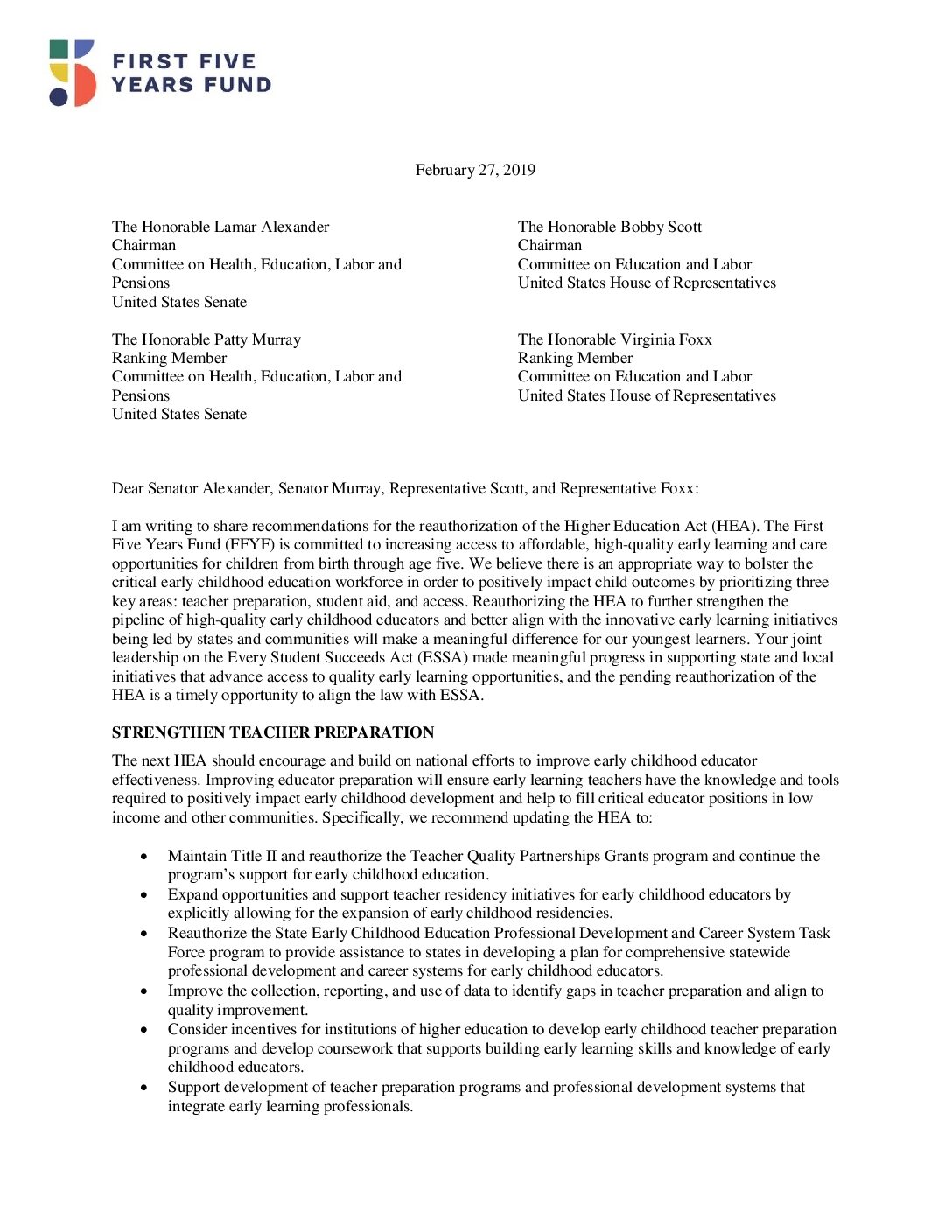Strengthening the Early Childhood Education Workforce through the Higher Education Act

Today, the House Committee on Education and Labor is holding a hearing on H.R. 4674, the College Affordability Act, which reauthorizes the Higher Education Act. Earlier this year, First Five Years Fund sent a letter to House and Senate committee chairs and ranking members with recommendations on how the legislation can play an important role in supporting state and local efforts to strengthen and professionalize the early childhood workforce.
February 27, 2019
The Honorable Lamar Alexander
Chairman
Committee on Health, Education, Labor and Pensions
United States Senate
The Honorable Patty Murray
Ranking Member
Committee on Health, Education, Labor and Pensions
United States Senate
The Honorable Bobby Scott
Chairman
Committee on Education and Labor
United States House of Representatives
The Honorable Virginia Foxx
Ranking Member
Committee on Education and Labor
United States House of Representatives
Dear Senator Alexander, Senator Murray, Representative Scott, and Representative Foxx:
I am writing to share recommendations for the reauthorization of the Higher Education Act (HEA). The First Five Years Fund (FFYF) is committed to increasing access to affordable, high-quality early learning and care opportunities for children from birth through age five. We believe there is an appropriate way to bolster the critical early childhood education workforce in order to positively impact child outcomes by prioritizing three key areas: teacher preparation, student aid, and access. Reauthorizing the HEA to further strengthen the pipeline of high-quality early childhood educators and better align with the innovative early learning initiatives being led by states and communities will make a meaningful difference for our youngest learners. Your joint leadership on the Every Student Succeeds Act (ESSA) made meaningful progress in supporting state and local initiatives that advance access to quality early learning opportunities, and the pending reauthorization of the HEA is a timely opportunity to align the law with ESSA.
STRENGTHEN TEACHER PREPARATION
The next HEA should encourage and build on national efforts to improve early childhood educator effectiveness. Improving educator preparation will ensure early learning teachers have the knowledge and tools required to positively impact early childhood development and help to fill critical educator positions in low income and other communities. Specifically, we recommend updating the HEA to:
- Maintain Title II and reauthorize the Teacher Quality Partnerships Grants program and continue the program’s support for early childhood education.
- Expand opportunities and support teacher residency initiatives for early childhood educators by explicitly allowing for the expansion of early childhood residencies.
- Reauthorize the State Early Childhood Education Professional Development and Career System Task Force program to provide assistance to states in developing a plan for comprehensive statewide professional development and career systems for early childhood educators.
- Improve the collection, reporting, and use of data to identify gaps in teacher preparation and align to quality improvement.
- Consider incentives for institutions of higher education to develop early childhood teacher preparation programs and develop coursework that supports building early learning skills and knowledge of early childhood educators.
- Support development of teacher preparation programs and professional development systems that integrate early learning professionals.
- Support efforts to align teacher preparation programs with state early childhood standards and systems and coordinate and align institutions of higher education with state and local early childhood initiatives.
SIMPLIFY AND IMPROVE STUDENT AID
Investment in financial assistance and support for early childhood educators are needed to ensure communities are able to recruit and retain individuals committed to improving children’s development. HEA should provide access to the resources necessary for teachers to attain specialized early childhood training and skills, as well as supports for existing high quality early childhood educators, so they will continue in the profession. To strengthen the early childhood workforce, we recommend the following:
- Identify and provide incentives to attract and recruit high-performing students into the early childhood education profession. This step could include creating a federal commission to study strategies for recruiting, preparing, retaining, and rewarding early childhood educators.
- Maintain the current federal loan forgiveness program for early childhood educators and consider enhanced incentives for early childhood educators to take advantage of loan forgiveness opportunities. The TEACH Grant program and other incentives designed to attract high performing students to the teaching profession should recognize early childhood education as a high-need field.
- Expand work-study opportunities for students to allow them to fulfill their commitment by working in high quality early childhood education settings.
PROMOTE ACCESS AND COMPLETION
Given the unique challenges facing undergraduate parents, the HEA should support programs that help them achieve postsecondary success. The ability to access high quality childcare for undergraduate students with children is one of the many factors that can impact whether a student persists and graduates. To help undergraduate parents attain their postsecondary goals, the HEA should:
- Reauthorize the Child Care Access Means Parents in Schools program, which is designed to support the participation of low-income parents in postsecondary education by providing grants to institutions of higher education to establish or sustain spaces in campus-based child care programs for the children of the lowest income students, those receiving Pell Grants.
- Increase the Income Protection Allowance (IPA) for independent students with children and modify the IPA to protect a certain amount of income for childcare costs.
- Incentivize two- and four-year colleges to develop articulation and transfer agreements to facilitate the completion of a bachelor’s or advanced degree in early childhood or a related field.
The First Five Years Fund recognizes the many issues your Committees face as you make decisions regarding the reauthorization of the Higher Education Act. Thank you for considering our recommendations for updating the Higher Education Act to support states and communities that are working to expand high quality early learning opportunities. Updating the law to align with and support local leadership, along with ESSA’s important early learning provisions, will help numerous children and families across the country. We look forward to working with you and your colleagues during the reauthorization process.
Sincerely,
Sarah Rittling
Executive Director
First Five Years Fund
Subscribe to FFYF First Look
Every morning, FFYF reports on the latest child care & early learning news from across the country. Subscribe and take 5 minutes to know what's happening in early childhood education.




